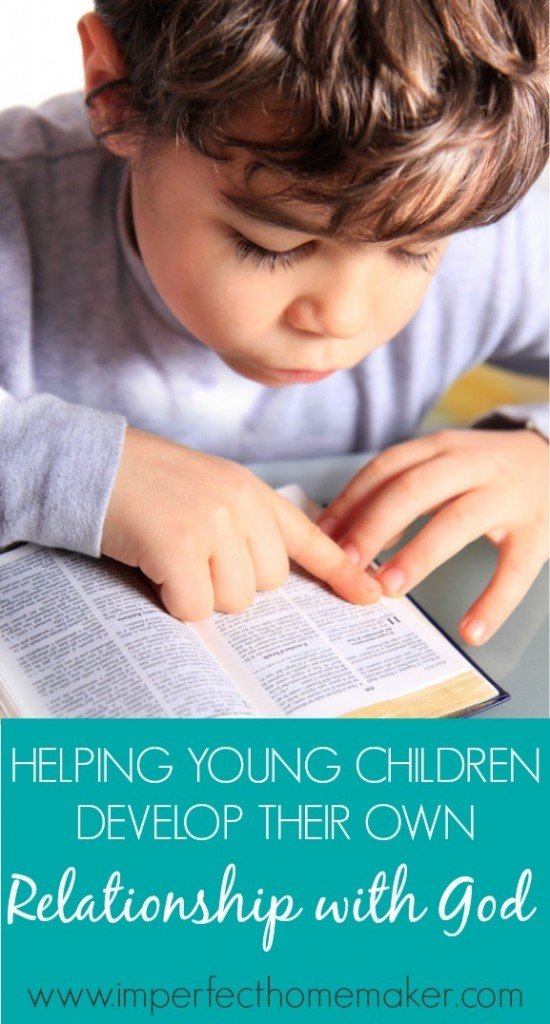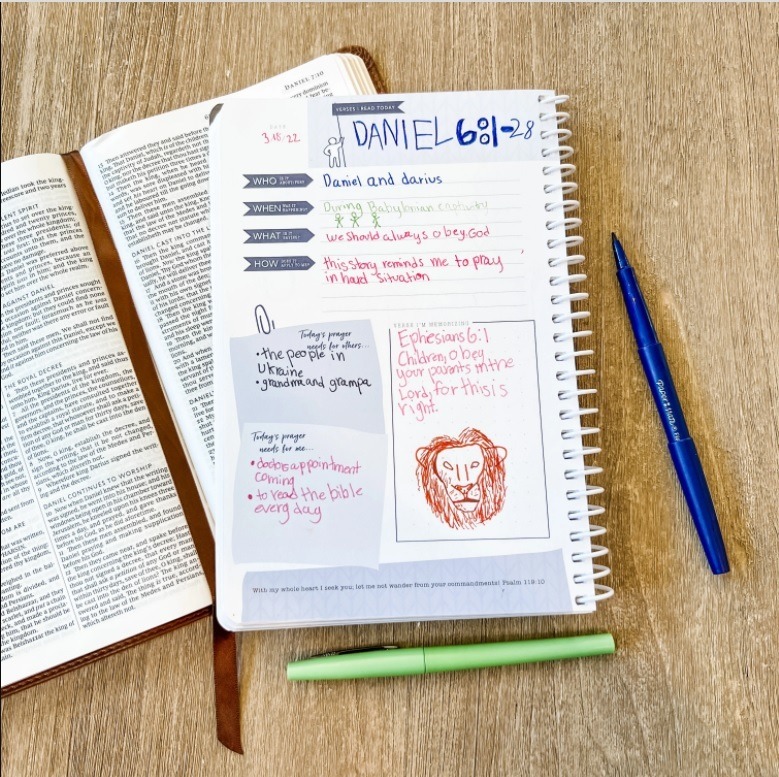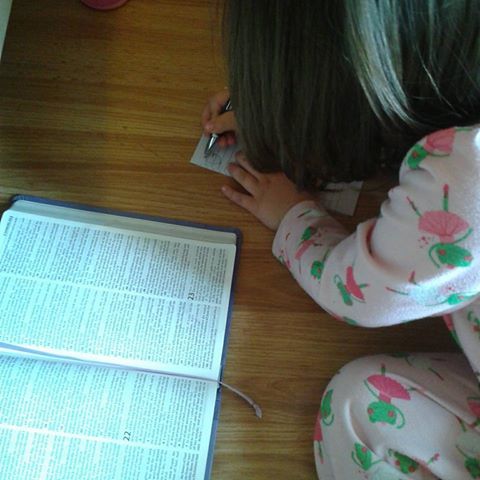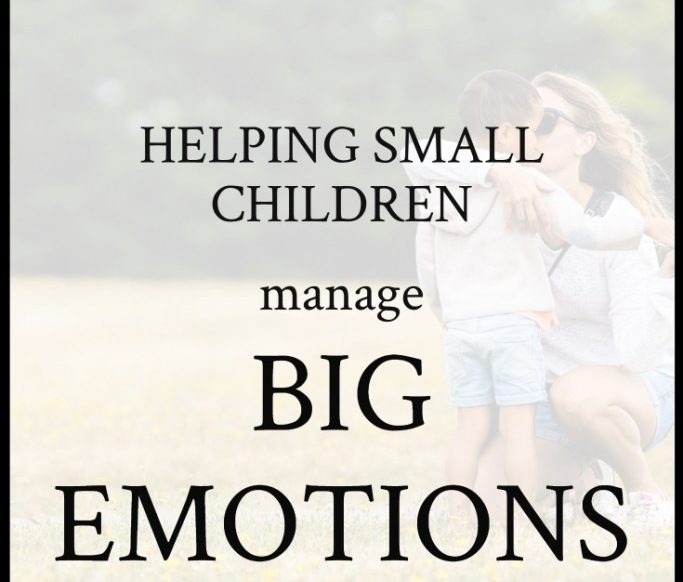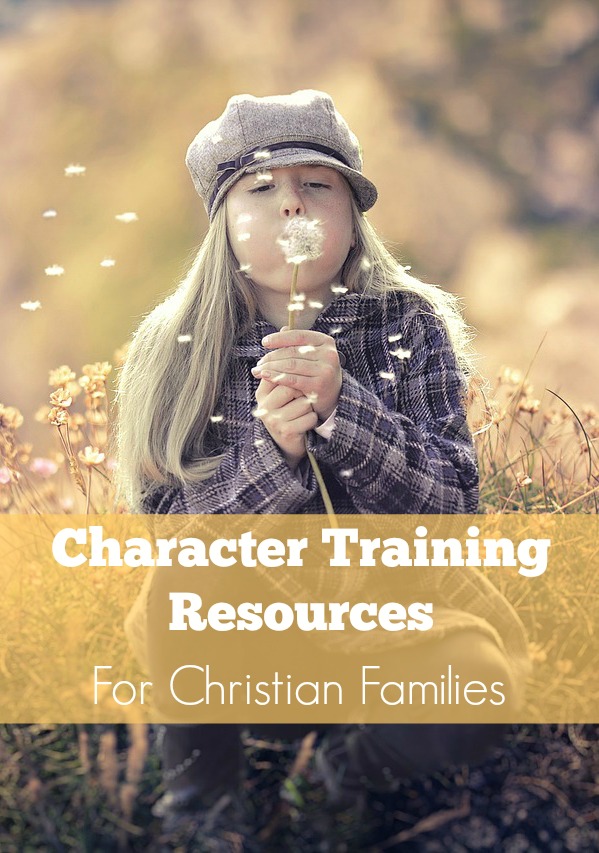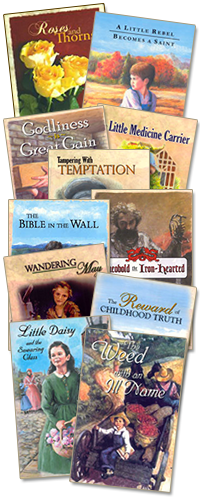Have you heard about the new feature from Build a Menu?
Helping Young Children Develop Their Own Relationship with God
It has been the desire of my husband and I to instill a habit in our children of spending time in the Word of God and prayer daily.
I want them to grow in their knowledge of and trust in God, and I want them to get to know him in a personal way.
Before they could read, I would invite them to join me as I spent my own time studying the scriptures and I would read aloud to them.
Now that the older two can read, I want them to start spending personal time alone with God.
But the question I had was how to help young children understand what they were reading!
I started out by jotting down questions from the day's passage for them to answer. Then I found that I needed to explain certain words for them. Trying to get all this written down ahead of time for them was becoming time-consuming and I often didn't have it ready for them when a new day began and they were ready to start on their Bible reading.
I found a couple different options that I recommend for parents who are trying to help their children develop their own quiet times with God.
Option one:
Exploring the Bible: A Bible reading plan for kids
I didn't want a children's devotional that was basically a cutesy story with a Bible verse to go with it. I wanted something that would actually help my children understand how to study the Bible for themselves, and this book fits the bill really well.
Exploring the Bible takes children on a tour through the Bible, laying a foundation for their knowledge of God and the gospel.
It contains:
- Daily Bible readings
- Prayer points
- Memory verse
- Discussion questions
- Space for sermon notes and reflections
This particular book says it's for ages 6-12. My children started using it when they were about 8 years old, and it was a tiny bit challenging for them even at that age.
Option 2:
Once children are a little older, they can start studying out a passage for themselves without specific prompts.
This Quiet Time Journal helps kids learn how to ask themselves questions as they read.
This journal is not a Bible reading plan – it is meant to be used with whatever passage of scripture your child chooses to study. This is a great option for older kids or teens who are becoming more and more independent.
I love to see my kids pick up on the blessing of having access to scripture and getting to know God better from it! I hope these tools will help your kids do the same!
There is no reason to wait to get started teaching your children to spend time developing their own relationship with God!
10 Ways to Save Money on Homeschool Curriculum
Every homeschooling mama knows how quickly curriculum can add up!
If you're like me, you're always trying to pinch pennies and make your homeschool dollars stretch as far as you can!
Here are 10 ways to save on homeschool curriculum, in no particular order.
I have moved all of my homeschooling posts to christianhomeschoolfamily.com.
You can go here to read this post at the new site.
Disorganized Homemakers Rejoice! Get Pre-made Menus in Your Inbox
But they've added a new feature that I really like too – the DONE FOR YOU meal plans — and for a limited time they are FREE when you buy the original menu planning service (reg. $30!)
So, what you get is:
- Access to the classic menu planner as I described above, where you can pick and choose which meals you want to make. There are options for every kind of diet needs (Trim Healthy Mama, Gluten Free, Paleo, Normal People :), etc. )
- Pre-made menus delivered to your inbox each week. If you happen to be disorganized one week and don't log in to create your own meal plan, you've automatically got a pre-made menu arriving as a a back-up! AWESOME!
or
Buy the classic plan now for $35, get the done for you plan FREE!
(This is for a full YEAR's worth of menus!)
P.S. This sale is only going for a few more days. After that the service goes back up to full price and the Done For You plans are NOT included.
Sale ends in:
Helping Small Children Manage Big Emotions
As far as I can remember, I was not a highly emotional child. (Maybe I was and just forgot what it was like.) But when I had children of my own, I was in for a bit of a surprise! I had one child in particular whose big emotions were a regular part of our family life.
She would erupt into screams at the drop of a hat. And as the saying goes, she would drop the hat.
If she even imagined that she stubbed her toe, she would cry as loudly as if she’d broken it.
If her brother was being mean to her, she could deliver quite an intimidating speech.
If she was disappointed, there would be weeping and wailing.
I was rather surprised by all this drama, and for a long time I didn’t know how to handle it. My knee-jerk reaction was to tell her that she needed to stop overreacting. But my efforts to stop the emotional outbursts in their tracks almost always made her cry all the harder.
I'm not a perfect parent, but I've at least learned since then that shutting someone's emotions down is not wise.
Below are some of the ways I've attempted to help my children
- Use their feelings as information
- Learn strategies to calm themselves
- Learn to respond appropriately to how they're feeling
I came up with three different aspects that go into helping my children mange their big emotions.
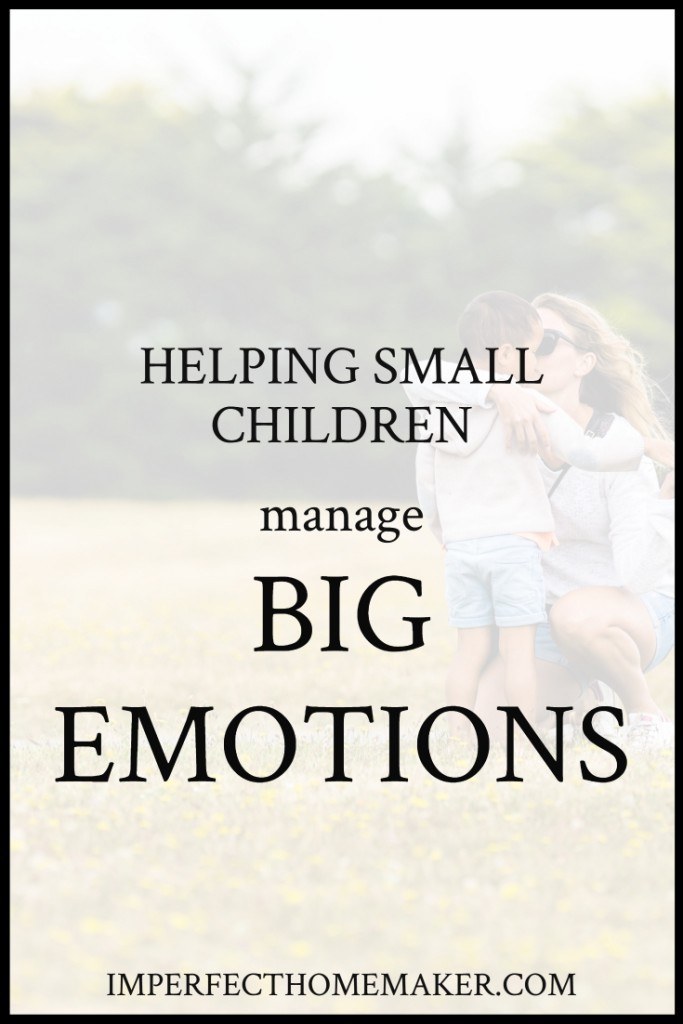
1. First, I've learned to view their big emotions with a compassionate heart and a curious mind.
Children's big emotions can be driven by many, many factors, such as hunger, tiredness, frustration, or simply from feeling the intensity of navigating a confusing world while their brains and bodies are rapidly developing.
We as adults can find ourselves experiencing unpleasant feelings that seem to have no logical origin. We can feel a nagging sense of worry, or we can feel a bit weepy, or we can feel crabby. Most adults know better than to push those feelings outward onto others. We know that to be snappy with others would not be right even though our bodies might feel grumpy. We'd be socially embarrassed to let tears start flowing in front of everyone when there's not really a logical reason to cry. But that doesn't change the fact the fact that we do feel those emotions. And the reasons behind those are often the same reasons behind what are children are feeling in their bodies too – hunger, tiredness, hormonal shifts, or simply the intensity of navigating the daily stresses of the world.
Sometimes the things we feel do overpower us, and we do find the tears flowing over nothing in particular. We do find ourselves being short with others when our bodies are tense with stress. We are more likely to have compassion on ourselves at these times, though, because we understand where those behaviors are coming from. We recognize our hormonal cycles and know that even though there's not a “reason” to cry, the hormonal changes are reason enough. We should apologize when we've spoken to others out of our grouchiness, but we also know that the issue was more about the weakness of our body than it was intentional wickedness.
Helping a child with their big emotions is no different. To tell them to stop overreacting is to discount all the tiny, real feelings that have built up inside their body. When our child's emotions start spilling over onto the people around them, a compassionate hug will go a lot further to calm them than a stern word.
As Christian parents, the fruit of the spirit should be spilling over from us onto our children. Are we showing them the gentleness of the Holy Spirit?
2. Proactively teach children how to respond to what they're feeling.
When a child is already upset, they will not be able to engage the rational, thinking part of their brain. The heat of the moment is not the time to teach my children how to respond when their siblings are rude or when they didn't get the biggest helping of dessert.
Some of the emotions I've tried to proactively teach my children how to handle are
- anger
- disappointment
- frustration
So for example, we can have a conversation like this, “If someone does something you don't like, what can you do? Should you scream at them? Or can you ask them nicely to stop? And if they don't stop, what can you do? Can you come ask mommy to help you?”
We can teach our children how to use words rather than screaming or hitting when they're feeling angry or frustrated. Then in the moment, when their big feelings rise to the surface, we can remind them of what they've already learned.
3. Teach children additional calming techniques.
Help them take deep breaths to calm themselves when they're upset. Teach them how to leave an upsetting situation rather than engaging with it. Teach them how to be in tune with their physical needs like food, water, and sleep, which will greatly impact how they're feeling emotionally.
All of these things take consistent practice and teaching, and that is why the gentleness and compassion mentioned in point number one are so important. Compassion does not excuse our children's bad behavior, but it does investigate whether there are underlying needs that have gone unnoticed (blood sugar, hydration, sleep, emotional connection, getting away from overstimulation.)
Children need to understand that emotions are normal and that they haven’t done anything wrong by having those feelings. But they also need to be taught what to do with those emotions.
As parents, we need a lot of wisdom to know how to help our children with their big feelings. Thankfully, God promises that he will provide it (James 1:5).
Here are some resources that have helped me as a parent to understand a little more about my children's big emotions:
affiliate links below
1. The Highly Sensitive Child: Helping Our Children Thrive When the World Overwhelms Them
(These books are not written from a Christian perspective, but I have learned many things from them about the way the brain works that allow me to be a more understanding and gracious parent.)
How to Choose the Best Homeschool Curriculum
Are you planning to homeschool but having a hard time wading through all the curriculum choices? Do you need some help understanding how to choose the best homeschool curriculum?
I completely understand!
I have moved all of my homeschooling posts to christianhomeschoolfamily.com.
You can go here to read this post at the new site.
Character Training Resources for Little Boys and Girls
As a mom, the most important thing I can do for my kids is to direct their hearts toward God's Word and help them learn to live for Him.
When I come across quality resources that equip parents to train their children according to God's Word, I get my hands on them any time I can!
That's why I'm really excited about the Build Your Own Bundle sale, which has an entire bundle of character training resources priced at 87% off!
My favorite resources include:
- My Brother's Keeper (Dealing with sibling rivalry)
- Lads and Ladies of Wisdom (5 months of character lessons and copywork
- Character Building Collection (11 books for kids – these are normally $29; the entire bundle is only $19!
- Proverbs people (helping kids learn about the wise, the simple, the scorner – I'm working with my kids on this right now!)
- Growing in Wisdom (Anger/Self-control; Tattling/Love; Laziness/Diligence – and much more!)
Pick up this whole bundle for $19; reg. $141!

